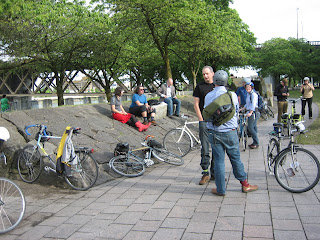This cemetery, located in the heart of southeast Portland, holds Civil War Veteran's remains and a Gettysburg Memorial, which was dedicated in 1939. Southerners don't own the rights to Civil War fascination! Little did I know that June 2012 marks the 150th anniversary of Oregon's connection to the Civil War (or the exact definition of Sesquicentennial). General Howard fought in the Battle of Fair Oaks, Virginia, and he eventually settled in Portland, OR. Read more about Oregon/Civil War Connections here.
Furthermore, I've known from reading Lincoln: The Biography of a Writer, that Shakespeare was never far from Lincoln's mind, and our president had a personal affinity for the melancholy and humor of Hamlet. The author, Fred Kaplan writes
And, during his presidency, Claudius's soliloquy came frequently to mind, in reference to his own "offences," at least in moments in which he thought it possible the war might not be worth so much Sourthern and Northern blood. Was the war not also a form of self-murder, brother against brother, which, as a Southerner by birth, Lincoln could especially feel? 'What if this cursed hand / Were thicker than itself with brother's blood-- / Is there not rain enough . . . ?'
 |
| This ain't humid, y'all! |
One of the things I treasure about Portland, is the quality and quantity of outdoor Shakespeare each summer. And they're free. Portland's Parks (and cemeteries apparently) just lend themselves to outdoor theater, and Portland's people lend themselves to audiences. After months of gray, we take every opportunity to be out in the sunshine, warmth, lush, color and overall pleasantness that is Portland in the summer time. The living is, indeed, easy.
Towards the end of the play, as shadows inward crept, we felt the melancholic turmoil of Hamlet grow. The ensemble set up lights around the outdoor stage, and I inwardly noted the lack of bug-cloud surrounding the dusky lights. The comedic elements waned and the tragic waxed, as Hamlet shouted for Orphelia to "Get thee to a nunnery," and later scolded his mother/aunt for the impropriety and alacrity of her marriage to his uncle.
The play ended as we all knew it must, but Portland doesn't stay morose for long in the summer: exuberant shouts of Naked Bike Ride coincided with the audience's exeunt from the Graveyard. Well done, Portland, Well done.












